 Tania McCartney
Tania McCartney
Most frequent line used in bad movies about the end of the world.
2) Do you have any unifying theories when it comes to acting?
I don’t mind talking about or trying to theoretically analyze acting on my own time, but it’s way more efficient when you’re actually doing it. Amid a rehearsal process or when a film is in production, ‘theorizing’ as opposed to ‘doing’ will impede the project. In a theatre school, it’s dangerous for students to pay too much mind on theory of ‘how to act’ because when they finally get down to playing a role, their minds will be fixated on recollecting what Stanislavsky or Hagen said instead of practicing being alive in a moment. Acting is an emotional sport that needs to be practiced at all times and acknowledging your life experiences.
3) Most challenging role you’ve attempted?
Malvolio in Twelfth Night. As a preying mantis. With a German accent. In geisha-girl make-up. In Fayetteville, Arkansas. (In case you’re wondering, there is no terrifying like the terrifying of two thousand people all slowly chanting, “Soooooooooey Pig…” in unison. It was like the college football version of Lord of the Flies.)
4) What’s the most common failing of independent theatre in Toronto?
Not appealing to a broader audience. I think as artists we have to figure out how to attract the masses without compromising our creativity. I feel like the stories we tell represent a much more varied society than we are playing to. Theatre isn’t meant to be elitist. (Also, I’m unemployed right now – WHAT-UP-WITH-THAT?!?!!)
5) What’s the best thing about theatre in Toronto?
The sense of community. The Indie theatre scene in the city is unlike the old guard in the sense that we realize we’re are all fighting the same battle. We share a relatively small audience for a major city. It’s dysfunctional to see each other as “competition.” I think emerging theatre companies realize that there is far more to be gained through supporting each other, sharing resources and talent, and creating common goals. And with some conversations I’ve recently had with other artists at the same point in their careers, I feel like we could be on the verge of some very exciting times for local theatre.
6) What’s the difference between theatrical clowning and theatrical acting?
The fourth wall. When a clown walks out on to the stage, the most interesting thing they see is the audience. Actors will go to great lengths to pretend that no one is there. If you cough in a clown show the clowns will acknowledge that and deal with it. I’ve seen outdoor dramatic theatre shows where a plane flies overhead and the actors have to pretend that it didn’t happen. As a clown I love it if an audience member starts talking or gets a phone call or arrives late or leaves early. It allows me to deal directly with them and gives me a chance to work with the audience and to temporarily get out of any prepared storyline. Another difference is playing neutral. For an actor neutral is devoid of feeling or emotion – for a clown it is feeling everything at once in balance. Clown neutral holds a lot of tension as the clown could burst out into any emotion. Oh, and a bunch of clowns are harder to direct than actors.
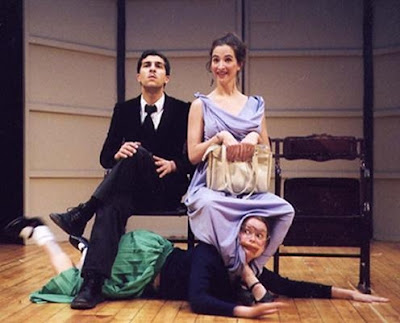 Adam Paolozza
Adam PaolozzaI think that all theatre is movement based. You never go to the theatre and receive any information telepathically. I suppose that if we follow this line of reasoning then dance would be considered theatre, as well. Maybe that isn’t too far off the mark. All performance relies on language and play – whether the language is words, gestures or movement. Maybe we should all just call ourselves performers. Then we could dance, speak or mime without offending anyone. Of course that would be a bureaucratic nightmare for grant writing – how would they organize all those applications?
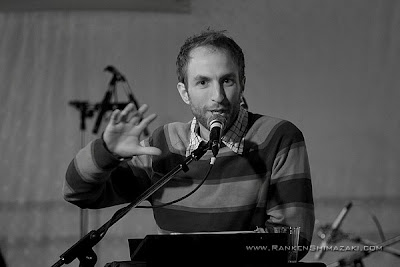 Josh Bloch
Josh BlochYou don’t get carte blanche to whack the audience over the head with a social message just because you got one. Theatre that comes from a progressive, radical, left-wing perspective should still follow those basic tenets of what makes theatre work. Somehow “political art” has come to represent highly didactic, message-driven art with a lefty agenda. To me this is just bad art. Political art can be hysterical, nuanced, rife with dramatic tension, full of complex characters and all the other things that we love about theatre. Any theatre artist solely driven by the desire to deliver a message to the audience is wading into some dangerous waters.
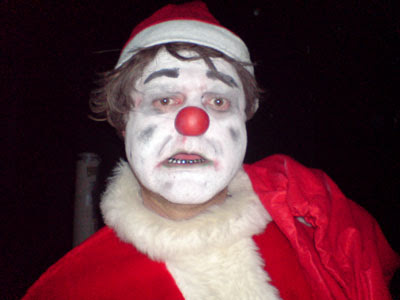 Santa
SantaThere are two types of Santa that are popular these days: the traditional Santa and the Bad Santa. For the traditional Santa you need to get your outfit together and to be as accurate to whatever depiction of Santa you like best. Get lots of cheap gifts to hand out. Kids love free candy no matter how cheap it is. The mental preparation is to get to a contagiously happy place and keep that going for about 4-5 hours. It is not as hard as it sounds if the people you are greeting are feeding you back with positive responses.
Since the movie Bad Santa came out people have actually been looking to hire Bad Santas. Never wash the Bad Santa suit. You will need to have a flask with some really smelly booze in it to occasionally spill on yourself and sprinkle on your beard. Don’t bathe in advance. A gruff voice works well. To get the drunken aspect down you need to practice trying to find your centre of balance and failing. Review what is known about Santa, including lines from carols, christmas specials and the ’Twas the Night Before Christmas poem. Improv experience really helps as you are expected to be witty without coming across like you know that what you said was witty. Bruce Hunter would make a good Bad Santa, Oscar Wilde not so good.
10) How do you remember an entire play’s worth of lines?
Well, that’s what you are paid (fingers crossed) to do. However, by the time the play is ready to be performed, it’s no longer memorized “lines” it’s actually more like memorized “moments”: dialogue combined with physical action, intention, reaction, lighting, sound, emotion, audience, blah, blah. Some of my best moments have come when I don’t know what I’m supposed to say and simply react. Some of my worst? When I don’t know what I’m supposed to say and don’t react. As Renton said: “It’s a fookin’ tight rope, Spud.”
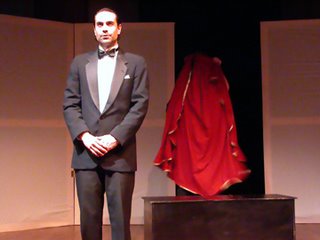


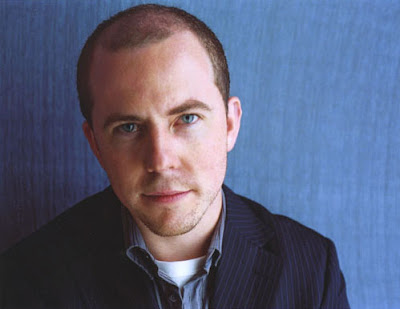

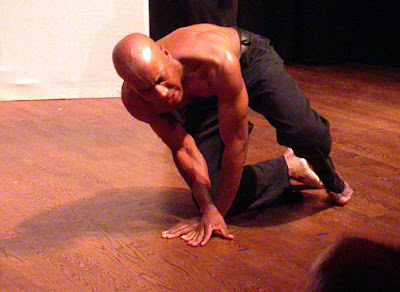
Sweet, we already have enough material for a best of. Is there any way we can work Troy McClure into this?
Josh Bloch’s awesome questionnaire (excerpted in this Greatest Hits collection) got this blog noticed by Brendan Jones Conservative Party’s spiders. Click the link:
http://cscan.brendanjones.ca/index.php?k=josh+bloch
Should we be worried?
I think it’s interesting to see that when you put all these artist questionnaries together, a relatively cohesive voice emerges.
Hmm. Not sure I agree. They seem cohesive inasmuch as they appear (at first glance, anyway) to come from a similar cultural pool: most are Canadian, I believe, and are artists or actors, Toronto-based . . . under 40.
The point is that this is a relatively restricted sample group and even within it there are some farily divergent ideas.
Cohesive? Yes. To a point. But let’s not get carried away.
did someone say cohesive?